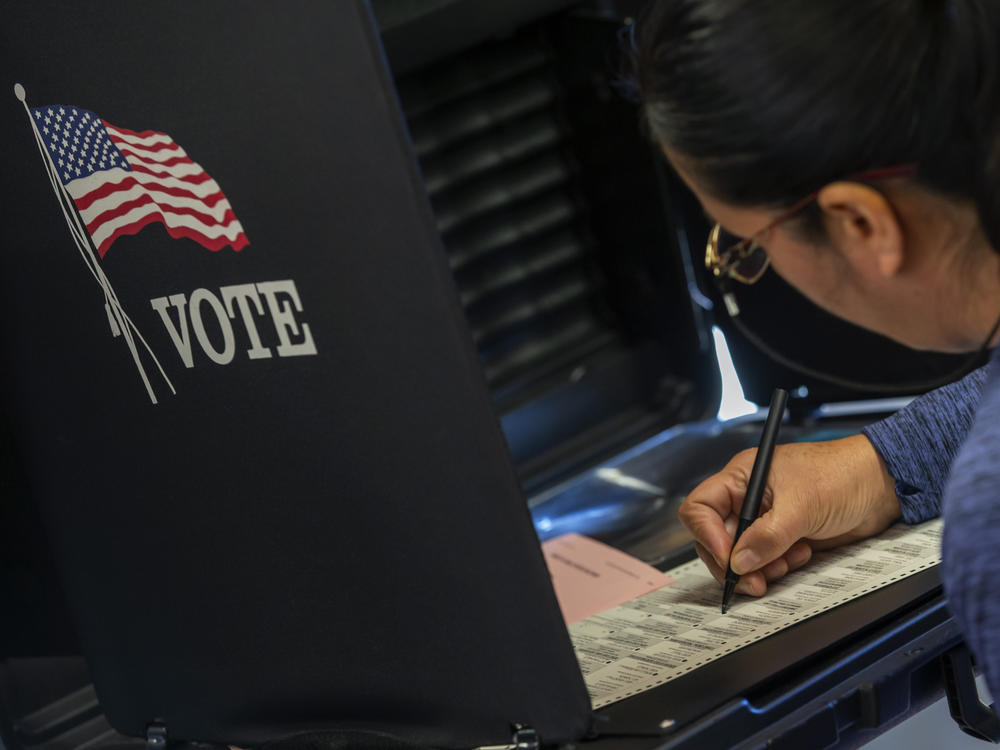Section Branding
Header Content
New Mexico's Republican Party takes the state's congressional map to trial
Primary Content
ALBUQUERQUE, N.M. — A three-day trial in New Mexico over the state's congressional map begins Wednesday. Unlike in certain other parts of the country with active fights over redistricting, it's the state's Democratic lawmakers who are accused of crafting illegal district boundaries.
In New Mexico, the state Republican Party and other plaintiffs argue the Democratic-controlled Legislature diluted GOP votes when it split the conservative southeastern corner of the state into three districts. Democratic leaders say redistricting is an inherently political process, and lawmakers acted appropriately in drawing a set of vetted, competitive districts.
New Mexico Democratic Rep. Gabe Vasquez eked out a win over incumbent Yvette Herrell last year in the state's 2nd Congressional District. The trial challenging the map used in that race comes ahead of a likely rematch between the two in the 2024 election.
New Mexico is one of a number of states currently litigating congressional maps. On Tuesday, the U.S. Supreme Court rebuffed Alabama's bold effort to maintain its GOP-drawn districts, setting the stage for potential resolution of legal fights involving the Voting Rights Act in other states. With a slim Republican majority in the U.S. House, the outcomes of these various redistricting cases could have a significant impact on the results of the 2024 election.
New Mexico's 2nd District previously encompassed the entire southern part of the state, including a portion of the oil-rich Permian Basin and vast agricultural land. It was redrawn to exclude part of the state's eastern border with Texas — a conservative-leaning area — and add a heavily Hispanic and Democratic part of Albuquerque, the state's largest city.
Is the gerrymandering "egregious" in New Mexico?
In January, the New Mexico Supreme Court decided the case could be heard in state court, without weighing in on whether the map is constitutional. In its order, the high court determined that some partisan gerrymandering is acceptable under the state constitution and the U.S. Constitution's 14th Amendment, as long as it's not "egregious."
It will be up to the lower court to decide where that line stands.
Attorney for the plaintiffs Daniel Gallegos argued in that hearing that the Democratic-controlled Legislature's actions amounted to a "constitutional harm" to GOP voters by violating the state's Equal Protection Clause.
"Our claim is excessive gerrymandering," he told the state's justices. "That this constitutes that egregious nature of gerrymandering."
Attorney for Democratic leadership Sara Sanchez argued the plaintiffs were pushing back on a district that is simply harder for Republicans to win than it used to be.
"There's no constitutional right to the same political performance that your district was before," she said.
State District Judge Fred Van Soelen ruled last year that the plaintiffs had a strong argument, but still allowed the map to be used for the midterm elections, which were quickly approaching. The New Mexico Supreme Court has asked Van Soelen to expedite the case to avoid disruptions to next year's election.
The justices have also ordered the lower court to use a three-part test in assessing the GOP's gerrymandering claims. The test was first laid out by U.S. Supreme Court Justice Elena Kagan in her dissenting opinion in Rucho v. Common Cause, a notable case on partisan gerrymandering. It asks whether lawmakers intentionally tried to dilute the votes of their opponents, whether they succeeded and whether they have any nonpartisan justifications for where they drew the lines.
How much can lawmakers talk about their deliberations?
The evidence the court will use to determine lawmakers' intent has already been a point of argument. The plaintiffs subpoenaed numerous current and former state legislators for depositions on the matter, according to court documents. But Democratic defendants filed for a protective order in August, asserting that the state constitution affords lawmakers legislative privilege, protecting them from testifying about the legislative process.
On Tuesday, the day before the trial, Judge Van Soelen issued a decision finding legislative privilege in this case "cannot be held as absolute."
"There must be limited ways in which a legislator's intent can be admitted to help in deciding cases before the courts," he wrote in a letter to both parties.
The judge said lawmakers can't be called to testify about their deliberations on the map. However, any statements made to individuals not directly involved in the legislative process before the map was enacted will be allowed. This could include statements made to the public, advocacy groups, journalists or even members of the state's congressional delegation. Van Soelen added that the map itself and its effect will be the court's primary means for gauging Democratic lawmakers' intent behind where they drew the lines.
The bench trial is expected to last through Friday. The court has until Oct. 6 to resolve the case.
Copyright 2023 KUNM. To see more, visit KUNM.
Bottom Content

